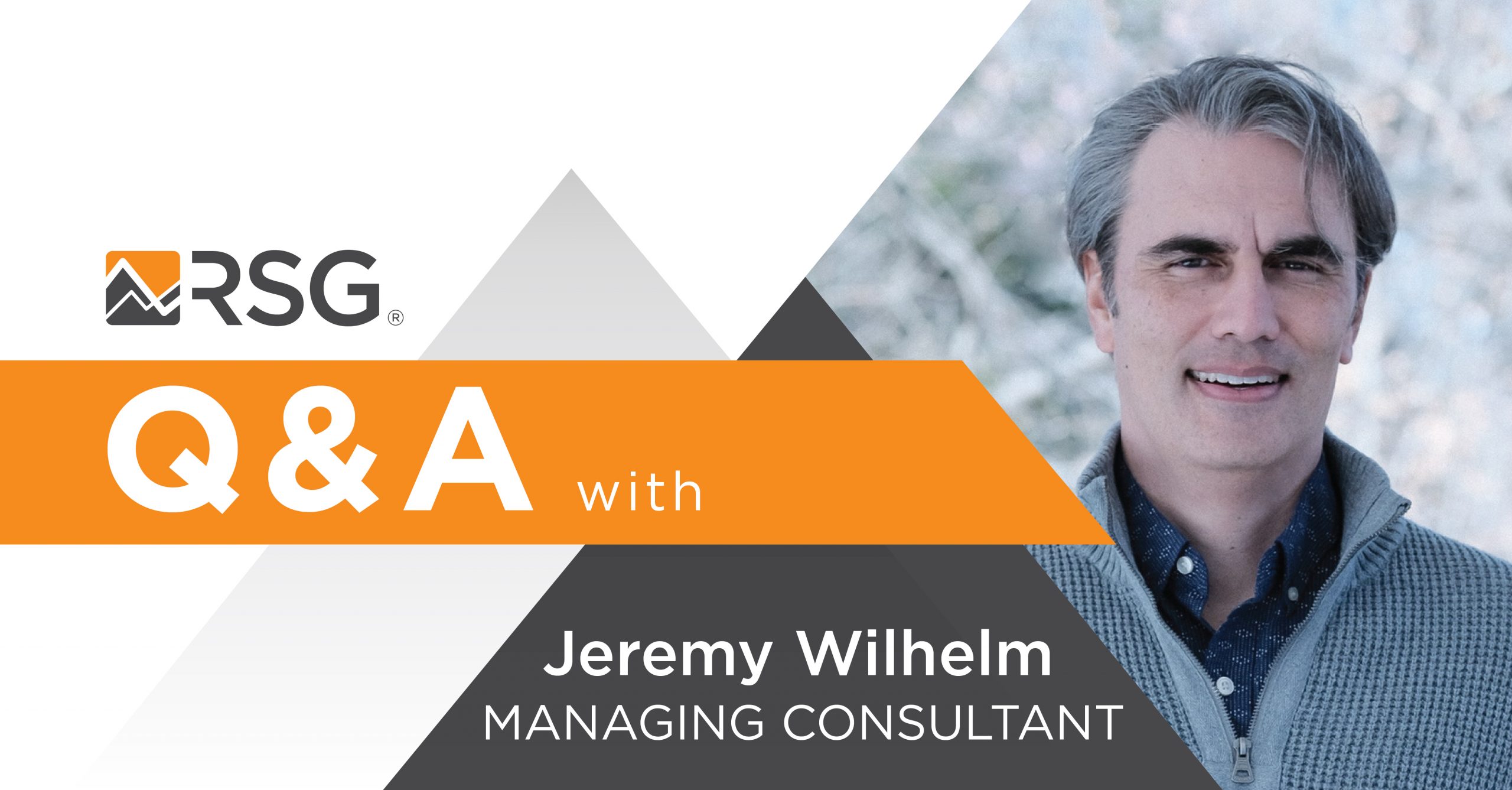Modern decision-making demands not just data, but data that is both accurate and actionable. Yet, capturing such data has become more challenging and costly. As decision-makers seek deeper insights into travel behavior and infrastructure use, they are asking more sophisticated questions. This drives up survey complexity, increasing respondent burden and, ultimately, survey costs due to lower response rates and higher data collection demands.
At RSG, we help clients navigate this complexity by applying advanced analytics and data collection strategies to support more confident planning, policy, and investment decisions. Whether addressing falling survey response rates or designing household travel surveys that reflect modern travel behavior, our work is grounded in a commitment to innovation and data integrity.
We connected with Jeremy Wilhelm, a Managing Consultant at RSG and a leader in travel survey design and implementation. He shared how RSG is adapting its approaches to meet today’s challenges and what organizations should be thinking about now to prepare for what’s next.
How are data collection expectations evolving, and how is RSG staying ahead?
Among RSG’s clients, there is continued interest in understanding more nuanced, variable travel behaviors. For example, many of our clients want to understand hybrid work patterns, specifically how often people commute versus work from home. That variability requires data collected across multiple days to allow for meaningful comparisons.
Among RSG’s clients, there is growing recognition that traditional assumptions about households and employment are no longer sufficient for effective transportation planning. Today, sample designs must accommodate increasingly diverse and harder-to-reach populations, from multigenerational households to individuals with nontraditional or irregular work schedules, including gig work and contract-based employment. These shifts have prompted RSG to evolve everything from how we design surveys to how we structure sample weights.
For example, for one recent project, RSG reworked our questionnaire around employment to better capture the complexity of modern work patterns, enabling us to produce more representative, actionable insights for our clients. We also regularly rely on diverse methods, including web browsers, apps such as rMove®, and telephone research centers, and we need enough representation of specific behaviors to analyze them confidently. It raises the bar for both sample design and response targeting.

Evolving travel behaviors, like flexible work, ridesharing, and gig driving, highlight why modern household travel surveys must capture day-to-day variability and reach increasingly diverse, harder-to-reach populations.
Still, the core expectation remains: Our clients need high-quality, representative raw data that can be weighted effectively while minimizing design effects. What is evolving are our methods, such as how we weight the data to better support the types of analyses clients expect to perform.
How is RSG tackling declining survey response rates?
Survey response rates are dropping across the board and the trend is accelerating. In some of RSG’s recent work, we’ve observed marked declines within a single study cycle, underscoring the evolving challenges in reaching respondents.
Several factors contribute to this shift. Many households check physical mail less often, so survey invitations now compete with a backlog of materials. Simultaneously, rising concerns about privacy and widespread exposure to scams have made people more hesitant to engage with surveys, especially those they don’t immediately recognize or understand.
To adapt, RSG is continuously testing and refining new strategies. For instance, we’ve updated our mailer designs to use clearer language and streamlined visuals, with a focus on cutting through the clutter and driving action. In some cases, we’ve also piloted more compact mail formats that simplify delivery and presentation, achieving strong performance even without added incentives.
We are also exploring digital outreach strategies that could complement physical mailings. This includes testing ways to raise awareness through platforms like Google or social media, helping recipients better understand the purpose and value of the survey before they receive an invitation. The goal is to build recognition and trust earlier in the process, which are critical ingredients for boosting engagement.

Privacy concerns, crowded mailboxes, and changing household habits have contributed to declining survey response rates, driving the need for new approaches to keep household travel survey data reliable.
While there’s no one-size-fits-all solution, RSG’s commitment is to keep innovating on behalf of our clients. This includes adapting to changes in behavior, technology, and trust to ensure our surveys continue to deliver high-quality data.
What post-pandemic trends have stuck around longer than expected?
One persistent trend stands out: Public transit still has not regained previous peak ridership levels in many areas, even as commute times rise and people spend more time in their cars. Despite strong efforts to promote it, transit has not seen the rebound many expected.
That may not be surprising to some, but the endurance of this behavior is notable. I’m a transit user. I chose my home based on walkable access to a heavy rail line, but I recognize that kind of access is rare. Most of the country is not built around transit, and that structural reality continues to shape many travelers’ choices.
Meanwhile, work-from-home trends have largely stabilized. While some larger employers and the federal government are adopting return-to-office policies, the data we are collecting on behalf of our clients does not yet show a full shift back. Instead, we seem to be at a new equilibrium. Our clients are interested in understanding that variability and new equilibrium, especially how often people commute and under what conditions.
Anecdotally, colleagues and peers involved in similar studies report that telework rates remain elevated and relatively “sticky” across the country. For now, both the persistence of remote work and the slow rebound of transit stand out as defining post-pandemic travel behavior trends.
How will artificial intelligence (AI) and evolving privacy frameworks shape the future of data collection?
AI is becoming embedded in nearly everything. At RSG, we have been responsibly testing tools that range from useful integrations to stand-alone platforms that build apps or websites. The potential applications of AI are wide-ranging.
In data collection, AI could transform how we design and administer surveys. It can reduce burden by tailoring how questions are asked, improving engagement, and lowering drop-off rates. AI can also provide real-time, in-app validation, replicating what a skilled telephone interviewer does by flagging unlikely responses and prompting for clarification. That kind of in-app logic can improve data quality without requiring additional effort on the part of respondents.
AI also shows promise in real-time coding of open-ended responses, helping streamline everything from survey design to quality control. But with those opportunities come important responsibilities.
Privacy must remain central to our work on behalf of clients. Any AI tools we adopt must uphold our commitment to data security and confidentiality. We also need to guard against inaccuracies. AI can be a great starting point for many tasks, but it always requires a human in the loop to ensure accuracy. This is something we emphasize at RSG through training and other processes.

AI can make travel surveys more intuitive and accurate, but thoughtful design and data privacy remains the priority for RSG and our clients.
As these tools evolve, we are committed to working closely with our clients to think about how to use them responsibly. The upside is real, but so are the risks. Success will depend on careful, thoughtful integration.
How is rMove helping clients collect better data, and what’s next?
What sets rMove apart is its proven track record. While other apps exist, rMove stands out for its consistent and repeated use in collecting client-vetted travel survey data. That means millions of trips, not just data points. That kind of scale builds trust and reflects the deep experience our team brings to using and improving the platform.
What excites me most is where rMove is headed. When it was first built, AI tools such as ChatGPT and other large language models (LLMs) were not available. Now, we are in a phase where AI can fundamentally change and improve how we collect, process, and validate data. Thanks to our experience, we are well positioned to lead this next evolution. We know what works, what doesn’t, and what clients need as we think about the future.
Even now, rMove delivers something few others can: usable, high-quality data across a full seven-day household travel survey window. Many tools rely on just the first day of travel, making the rest of the week less valuable. With rMove, every day counts—capturing day-to-day variability that strengthens the analysis. That’s a real differentiator when looking at rMove.
What sets RSG apart technically in data collection and analysis?
Our travel surveys are highly detailed, capturing complex, interrelated behaviors across multiple household members and days. To produce representative results, we apply nuanced weighting techniques that go beyond standard practice.
We use methods like day-pattern variation adjustments and bias corrections to address underreporting and missing data. We are especially careful about response bias. For example, people with simpler travel patterns are more likely to complete surveys, so we adjust for that to better reflect actual regional behavior.
Other research areas often work with simpler designs, such as product preferences or polling, where such complexity is rarely a factor. Our clients, by contrast, need to model behavior at a disaggregate level, which demands more sophisticated weighting and processing.
Some firms, especially those grounded in the traditional social sciences, aim to keep weighting simple to minimize design effects. But such traditional weighting approaches can fail to accurately reflect the subtleties of travel behavior, often at the cost of responsiveness. Conversely, we have often innovated out of necessity, and we have the expertise to do it well. Our team has the technical depth to design and refine these methods in ways that directly support RSG’s clients’ needs.
…………………..
Jeremy Wilhelm is a Managing Consultant at RSG with over 15 years of experience specializing in data collection and survey design, particularly in the household travel survey market. He has led some of the nation’s largest travel surveys, including the National Household Travel Survey, which engaged over 129,000 households, as well as statewide and regional efforts in Texas, Michigan, and Colorado. Jeremy excels at translating complex data into actionable insights, helping clients better understand travel behavior, improve response rates, and adapt to evolving technologies and privacy standards. His work supports more confident, data-driven decision-making across transportation planning and policy. Connect with Jeremy »



